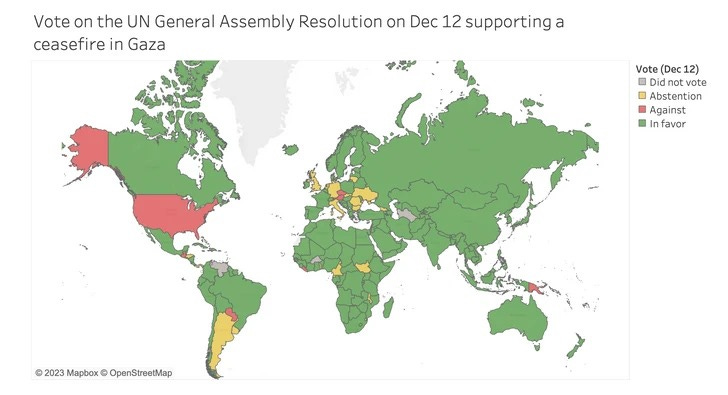Israel's imperfect options going forward
ICC seeks arrest warrants for both Netanyahu and Hamas
The International Criminal Court Prosecutor, recently announced applications for arrest warrants for Yahya Sinwar, Mohammed Diab Ibrahim Al-Masri (Deif), and Ismail Haniyeh of Hamas, accusing them of war crimes and crimes against humanity. These charges stem from attacks on Israeli civilians and the hostage taking that took place on October 7, 2023 - they include murder, torture, and rape.
Additionally, arrest warrants were sought for Israeli officials Benjamin Netanyahu and Yoav Gallant for war crimes and crimes against humanity that were committed against Palestinian civilians in Gaza from October 8, 2023. These charges involve using starvation as a method of warfare, intentional attacks on civilians and the systematic deprivation of essential supplies.
What I find interesting about this development is that, as far as I am aware, it is the first time that an arrest warrant has been filed against a Western leader for crimes against humanity.
In the aftermath of the Iraq War, the ICC's credibility notably came into question because of the court's refusal to put Tony Blair and George Bush on trial for the unprovoked invasion of Iraq. This obvious double standard made a mockery of international law and harmed efforts to resolve conflicts elsewhere. It put a serious stain on US leadership and further entrenched the principle of "might is right." It made the condemnation of Russia’s invasion of Ukraine by institutions such as the Hoover Institution sound hollow, because the Iraq War was justified under a similar pretext of "preemptive war" by historians like Victor Davis Hanson.
I don’t think the US establishment has yet come to terms with how much its credibility has been hammered over the years and the opinion of the "rules-based order" in the Global South in particular. There is a saying about international law “there are more people who teach it than practice it and when it is respected, it is done for convenience”. There are many examples of this, such as the trial of Slobodan Milošević, the selective prosecution of the Rwandan Genocide (which kept a US ally and génocidaire like Paul Kagame in power), and the bombing of Libya by NATO.
When asked to enforce international law, South Africa was notably reluctant when it refused to arrest Omar Al-Bashir in 2017, despite being a signatory of the Rome Statute. Eventually, our courts found that the government violated its own law. Theoretically, there should have been accountability, but it never materialized. The ANC deflected by saying that the ICC is a “Western Institution” and simply refused to arrest a man responsible for genocide.
It remains to be seen if Netanyahu, Hamas leaders, or any of the parties involved in this conflict will actually be arrested for war crimes. I am not holding my breath that any of them will end up in orange jumpsuits.
However, filing the arrest warrants do serve a symbolic value, demonstrating that Israeli propaganda can only achieve so much before the facts overwhelm the institutions that historically protected its leadership. One cannot face-lift an image when soldiers are seen indiscriminately killing civilians on twitter, or hide behind “rescuing the hostages” when even the spokesperson of the family of the hostages now have distanced themselves from Benjamin Netanyahu’s war aims.
Eventually the anomalies become too absurd to ignore and the war crimes too obvious to talk away.
But what is the way forward for Israel after its credibility has been so hammered? What does one say to those who have deep sympathy for its founding and who do not accept what its current government is doing. Decent Jewish voices and even dedicated Zionists, who have historically been sympathetic, and in favor of Israel, have all started taking a critical view of what is going on.
Joel Kotkin, for example, recently wrote an article on why Jews cannot afford to be divided on Israel. He is rightfully skeptical of the anti-Israeli movement and the recent protest, but it is notable that he also expresses criticism of Netanyahu and the extremist settler movement. My experience is that his sentiments are widely held by many decent Zionists.
The vast majority of American Jews, notes Pew, tend to support Israel but are hardly admirers of the right-wing Netanyahu government or its settlement policies.
In my view, the way forward for Israel is to reign in the settlers and commit to a two-state solution. Standing up to them seems to be the best way to guarantee a Jewish state in a predominantly Arab region, because as John Mearsheimer recently said, Israel effectively has four options:
A two-state solution
An apartheid state
Ethnic cleansing
A one-state solution
In the above list, Options 1 and 4 are the only ones that are democratically acceptable. However, given the demographic deficit, only the first option can guarantee a state that defines itself as a Jewish homeland. A state that can coexist with the Palestinians in a hostile neighborhood.
Israel essentially has a choice between co-existing with a Palestinian state or facing diplomatic isolation over time. Its current existence, as a de facto one party Apartheid State, depends on U.S. public opinion, and if the recent protests are a sign of what is to come, then its hardliner stance risks its very survival.
If there is one lesson to take from the Afrikaners in South Africa, then it is to negotiate before it is too late. PW Botha was initially reluctant and escalated the tensions. It was only after he suffered a stroke that the more conservative leader F.W. De Klerk chose to jump against the will of his party. In contrast, in neighboring Rhodesia Ian Smith tried to hold on to power. Smith ignored the good will of Bishop Abel Muzorewa in Zimbabwe and he ended up having to negotiate with the Marxist fanatic Robert Mugabe. Consequently Zimbabwe was better off in terms of prosperity in 1980, than it is today.
An imperfect world requires Israel to weigh up imperfect choices. Either negotiate for a two state solution, or end up with a one state reality.




The majority of Israelis have supported a two state solution since 1948.
In 1948 this was rejected by Palestinians and all Arab countries.
From 1948-1967 when Gaza and the West Bank were part of Arab countries there was no move to create a Palestinian State in these regions. Indeed the PLO explicitly excluded these regions from its claims. It only claimed Israel within within the green line as a Palestinian State. All of it.
In 1993 the Israel allowed the PLO into West Bank and Gaza to form a self-governing entity in return for the PLO renouncing violence and accepting Israel's right to exist. Unfortunately Arafat immediately made it clear (in speeches in Arabic) that he did not accept Israel's right to exist. Instead He said that Oslo was part of the 'phased plan' agreed by the Palestinian national Council in 1974, whereby they would accept any land they could get and then use it as a base to eliminate Israel. Arafat funded terrorism and violence against Israeli civilians escalated dramatically after 1993, forcing Israel to build barriers and introduce checkpoints to protect itself from terror attack.
In 2000 Israel offered the Arafat a fully independent state with their capital at Jerusalem. Arafat rejected this and made no counter offer.
In 2008 Israel offered Abbas a fully independent state with its capital at Jerusalem. He ignored the offer.
In 2005 Israel completely vacated the Gaza Strip, removing all Israeli presence and forcibly removing over 10,000 settlers. Since then Hamas, which was elected by Gaza residents, has transformed the strip into a military base from which they have attacked Israel with suicide bombers, then missiles, and most recently by a fully fledged Invasion.
It should be obvious now to everyone that Palestinians have no interest in a 2 state solution. They have consistently said since well before the founding of Israel that they will not accept the existence of a Jewish state in the region.
It seems like the only feasible solutions are:
(1) Palestinians are persuaded to accept the existence of Israel and a two state solution.
(2) Israel is eliminated.
(3) Palestinians are eliminated.
Most of the effort of the world seems to be focused on supporting those whose aim is (2). This includes Hamas, the Palestinian Authority, and the BDS campaign.
This will never succeed as Israel has nuclear weapons.
If you want to avoid (3) I recommend you focus on (1) and dial back support for those who support (2).